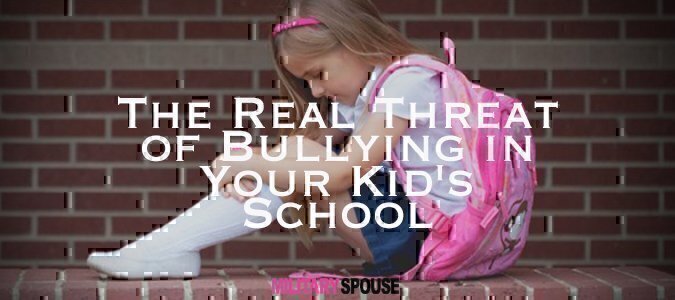When he was in the 6th grade, Amy Newton’s son experienced both verbal and physical bullying at the hands of a neighbor girl who rode the bus home with him. Newton, whose husband is active duty Air National Guard, suspected something was amiss because he was more quiet than usual after school. A friend of his accompanied him back to his house every day. “I could tell certain things were happening with him, he was withdrawing, He didn’t want to talk about anything,” Newton said. “You really have to look out for the warning signs. That’s where you have to catch it.”
She happened to be behind the school bus one day when the kids filed off. “As soon as the school bus pulled away, I saw her grab him and start choking him, and she had pushed his friend in a ditch,” Newton said. She quickly got the boys in her car and drove them home. When they got there, she tried to get more information out of them. They didn’t want to say too much because they had been hoping the situation would resolve itself.
The next day, Newton went to school to speak with administrators about it. They told her that because it was not on school grounds, they could not help her. “It was no longer a school issue,” Newton said, “and that’s not acceptable.”
She got law enforcement involved, and they went to speak with the girl’s family. “I told my son, ‘You need to tell me these things. If you don’t tell me, I can’t help…'” How can these kids speak up and try to get help because they are afraid of the retaliation?
More complicated to identify is whether one’s child is the bully. Haber said that kids feeling increased stress and tension may become more aggressive as a way to discharge that stress. Another factor is the amount of aggression being communicated in the child’s home. Kids may test out that behavior at school to get more attention from others, Haber said. “The parents’ stress is high with moves and deployments, and depending on how parents cope, that stress can be passed on as well.” He continued, “sometimes that can be passed on to other kids, and that can look like bullying itself.”
For parents who discover their children have bullied others, Haber recommends taking it seriously and speaking to them about it without anger. Ensure that the child remains accountable for his or her behavior while helping them assess the incident empathetically. Brainstorm ways to repair the situation.
If a child is a target of bullying, parents should listen in a nonjudgmental or blaming way and gather as much information as possible about the incident. Then empower the child to come up with a plan to respond to the bully situation.
Bullying is so common that parents need to be prepared to respond.
“It’s going to probably happen to your kids at some point, so you need to be armed,” Haber said. “You need to talk to them in a way that doesn’t make it more scary for them.”
While the experience of being bullied can be heartbreaking, it is also a chance for positive growth, Haber said. Haber is also the author of The Resilience Formula. Challengesare necessary for healthy brain development, he noted, and as kids overcome challenges, they become more confident to face whatever comes their way
“The vulnerability and potential risk is sad, but every person needs to face different kinds of adversity,” Haber said. “The way we grow and become more resilient is through adversity.”







